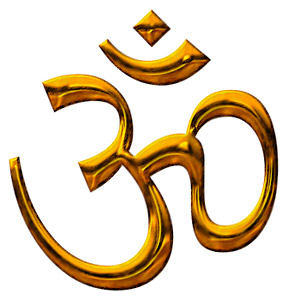 Omkara or Om is a spiritual or sacred syllable in the Hindu religion. Om is placed at the beginning of most Hindu texts as a sacred exclamation to be uttered at the beginning and end of a reading of the Vedas. It was used previously to any prayer or mantra and also is said in the beginning of any religious ritual. The syllable Om is first portrayed as comprehensive mystical entity in the Upanishads. In Puranic Hinduism, Om or Omkara is the mystic name for the Hindu Trimurti that represents the union of the three gods Lord Brahma, Lord Vishnu and Maheswar or Lord Shiva. The three sounds also symbolise in the three Vedas, they are the Rig Veda, Sama Veda and Yajur Veda.
Omkara or Om is a spiritual or sacred syllable in the Hindu religion. Om is placed at the beginning of most Hindu texts as a sacred exclamation to be uttered at the beginning and end of a reading of the Vedas. It was used previously to any prayer or mantra and also is said in the beginning of any religious ritual. The syllable Om is first portrayed as comprehensive mystical entity in the Upanishads. In Puranic Hinduism, Om or Omkara is the mystic name for the Hindu Trimurti that represents the union of the three gods Lord Brahma, Lord Vishnu and Maheswar or Lord Shiva. The three sounds also symbolise in the three Vedas, they are the Rig Veda, Sama Veda and Yajur Veda.
In the Vedas, it is said to comprehend all the gods; and in the Puranas it is directed to be prefixed to many sacred formulas. The syllable Om, says the Padma Purana is the leader of all prayers; and to be employed in the beginning of all prayers. According to the same authority, one of the mystical imports of the term is the collective enunciation of Vishnu expressed by A, of Sri, his bride, intimated by U, and of their joint worshipper designated by M. A whole chapter of the Vayu Purana is devoted to the term Om or Omkara. It is said to symbolise the three spheres of the world, the three holy fires, and the three steps of Vishnu, Shiva and Brahma.
Om or Omkara is also spelled as `Aum`. The Vaishnava Dvaita philosophies teach that `Aum` is an impersonal sound representation of Vishnu or Krishna while Hari Nama is the personal sound representation. In Advaita philosophy it is frequently used to represent three subsumed into one, a common theme in Hinduism. It implies that our current existence is mithya and maya, "falsehood", that in order to know the full truth we must comprehend beyond the body and intellect the true nature of infinity.
Omkara or Om also has much significance in other languages as well, such as Jainism, Buddhism and Sikhism. In Jain religion, Om, also pronounced as Aum, is considered to be a reference to the five parameshthis in Buddhism, Omkara or Om occupies the first syllable in their most sacred and important mantra, Om Mani Padme Hum and also in other mantras. Ikk Oankar is considered as the symbol of God in Sikhism.
Omkara or Aum is pronounced in three separate segments, A (aaa), U (ooooo) and M (mmmmm) in a long nasalised rounded vowel through prolonged exhalation. Nowadays, Omkara is visible thoroughly in Hindu artworks. Moreover it has become an important part of the culture and the general people who consider it as a holy and auspicious sign.









